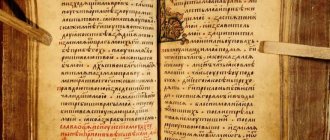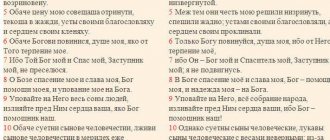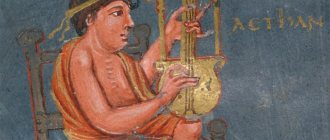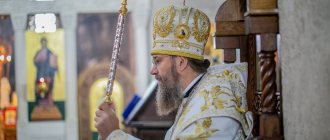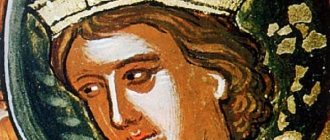Text of prayer Psalm 82
In Church Slavonic with accents
1 Song of psalm to Asaph,
2 God, who will be like You? Don’t be silent or subdue, O God.
3 Because your enemies have made a noise, and those who hate you have raised their heads.
4 Thy wicked will is against thy people, and thy counsel is against thy holiness.
5 Deciding: Come and I will consume from the tongue, and the name of Israel will not be remembered by anyone.
6 For having conferred together with one mind, I made a covenant upon Thee:
7 the villages of Idumea, and the Ishmaelites, Moab and Hagarites:
8 Ebal and Ammon and Amalek, foreigners with those who dwelt in Tire,
9 For Assyria also came with them to make the intercession of Lot’s sons.
10 Let us do to them like Midian and Sisera, like Jabim in Potat Kishova.
11 It was consumed in Endor, like the dung of the earth.
12 Put down their princes, like Oreb and Zibah, and Zebea, and Zalman, all their princes,
13 And he decided: Let us inherit for ourselves the sanctuaries of God.
14 My God, lay me down like a stake before the wind.
15 Like a fire that consumes oak groves, like a flame that consumes mountains,
16 So Thou hast wedded me to Thy storm, and troubled me with Thy wrath.
17 Fill their faces with dishonor, and they will seek Your name, O Lord.
18 Let them be ashamed and dismayed for ever and ever, and be confounded and perish.
19 And let them know that Your name is Lord, You are the only Highest in all the earth.
In Russian
1 Song-psalm of Asaph.
2 God! Don't be silent, don't be silent and don't remain quiet, God,
3 For behold, Your enemies make a noise, and those who hate You have lifted up their heads;
4 They have plotted evil against Your people and are taking counsel against those whom You keep;
5 They said, “Let us go and destroy them from among the nations, so that the name of Israel will no longer be remembered.”
6 They conspired with one accord and made a covenant against You:
7 the villages of Edom and the Ishmaelites, Moab and the Hagarites,
8 Ebal and Ammon and Amalek, the Philistines with the inhabitants of Tyre.
9 And Asshur came to them: they became a muscle for the sons of Lot.
10 Do to them as you did to Midian, as to Sisera, as to Jabin by the brook Kishon,
11 Which were destroyed in Endor, and became dung for the earth.
12 Deal with them, with their princes, as with Oreb and Zib, and with all their leaders, as with Zebah and Zalman,
13 who said, “Let us take possession of the villages of God.”
14 My God! Let them be like dust in a whirlwind, like straw before the wind.
15 As fire burns the forest, and as flame scorches the mountains,
16 So chase them with Your storm and throw them into confusion with Your whirlwind;
17 Fill their faces with dishonor, so that they may seek Your name, O Lord!
18 Let them be ashamed and dismayed forever, let them be ashamed and perish,
19 And let them know that You, whose only name is Lord, are the Most High over all the earth.
Interpretation
In Psalm 33, the author says that the Lord will save those who trust in him and praise him. For a more detailed interpretation, you should consider the verses separately:
- Verses 1-3 - the psalmist expresses the idea that moral people who glorify the Lord stand closer to him than others. At the same time, their praise must be sincere and come from the heart in response to any God's mercies.
- Verses 4-5 – The author explains the need to praise the Lord. After all, all the deeds he does are fair and righteous, you can always rely on his words.
- Verses 6-11 - they develop the idea expressed in the previous verses. The psalmist emphasizes that the intentions, plans and goals of the Lord cannot be undermined by anyone, and everything he has planned will be carried out from generation to generation.
- Verses 12-19 - in these lines praise is exalted to God, who not only created people, but also delves into their deeds and intentions. The author expresses his joy at being part of God's chosen people. He emphasizes that the Lord never comes to the aid of the proud and arrogant, and therefore neither powerful armies nor numerous cavalry will save them. Only to those who trust in him will he come to the aid in times of distress and need.
- Verses 20-22 – In the last verses of Psalm 32, the psalmist assures the Lord that the Jewish people trust in him, hope for his mercies, and praise him.
We advise you to study the Icon of Barbara the Great Martyr.
The main idea of Psalm 32 is that the Lord loves those who fear and honor him. It is to them that he will provide patronage and protection in difficult situations, feed them during hunger and “save their souls from death.”
History of writing
During the writing of Psalm 82, during the reign of King Jehoshaphat, a whole coalition of pagan tribes took up arms against the Jews, among which the main ones were the Philistines, longtime enemies of the family of Israel. In addition, the descendants of Lot, the same one whom the Angels brought out of Sodom, joined the pagans. The betrayal came as a complete surprise to the Israelis, and confusion grew in the army. And at that moment the prophet shared the revelation of the Creator and turned it into a song, which encouraged the army of the king of Israel. That is why Psalm 82 was included in the Psalter of King David on behalf of Asaph, the ancestor of the prophet Jhoziel.
Interpretation
Psalm 86 is short, but very symbolic. Here there is an example of humility for us - from infancy the Lord takes upon Himself all the conventions of human existence, right up to including Himself in the register of subjects of the Roman Caesar.
- Verses 1-2: The superscription signifies that the psalm is prescribed to the children of Korah. For modern Christians, Jerusalem is an image of the church, and birth in Jerusalem is churching and holy baptism. Most of all, the Lord glorifies those who have approached the church and found their way to the Kingdom of Heaven. The foundation of Jerusalem, that is, the church, is faith in Jesus Christ as the Messiah and Son of God. This concept contains church dogmas as the “walls” of the Christian Church. There is a struggle between the city of God and other “villages,” as between Christians and heretics.
- Verses 3-5: Praising Jerusalem as a holy Church, the prophet also remembers the foreigners who witnessed historical events for which Zion (as a collective image of all the events of the founding of the Church that took place on this holy mountain) became the mother.
- Verses 6-7: The Lord will arrange the economy of salvation for all nations in the Church, and will indicate the names in the heavenly book of life.
And this reminds us that we are not forgotten by the Lord, He knows about everything that lives in our hearts, it is important to Him even when and where we were born. We are all included in the register of the Lord's subjects and it is up to us whether we will be on the list of good or bad slaves and, moreover, whether we will go on to the list of sons and heirs
Why do they read Psalm 83?
Psalm 82 is heard in the church during the Easter service, at the polyeleos after the glorification of some saints. Also, the text of the psalm is heard as part of the 11th kathisma, which is read at the evening service.
The Monk Arseny of Kapakodia blessed the reading of Psalm 82 at home in order to prevent murder. This is relevant for those who are located near “hot spots”, as well as for those who are in mortal danger from evil people.
Interpretation
The text of the psalm sounds like a protest from the author, who is indignant at the outrages of wicked sinners, exposed to wealth and power. They have no barriers in realizing their sinful desires, oppressing and offending the righteous. The author addresses not the pagans, but the Jews who deliberately ignore the commandments given by God, mocking the Creator. The author appeals to God, while simultaneously addressing sinners, urging them to come to their senses.
To better understand the meaning of the song, you should analyze the interpretation of Psalm 93 for each verse:
- Verse 1-3: The time has come when the righteous Judge of the earth must avenge the crimes of the wicked rulers against His beloved people.
- Verse 4-7: The proud persecutors of believers will be judged. They arrogantly believe that the God of Jacob will not know about all their iniquities.
- Verse 8-11: It is foolish to think that God is unaware of anything! If He has the power to punish the nations, as history proves, can He not punish those sinners who oppress His loved ones? The Lord knows everything that the wicked think, and knows that their thoughts are empty and vain.
- Verse 12-15: The Lord teaches us that blessed is the one whom He instructs with His law. Jehovah will never forsake His people or forsake the inheritance He loves.
- Verse 16-19: The Lord always came to the rescue. Every time the author thought that he would perish from the insidious plans of people, the Lord supported him in His mercy.
- Verse 20-23: Can the Lord approve of those who commit sin? The answer is obvious. He will destroy sinners from the face of the earth for all their iniquities.
Interpretation of Psalm 83
The author turns to God for help in the fight against the tribes of pagans who have set themselves the goal of destroying the people of Israel.
- Verse 1: The prophet reports great danger from the united tribes of the pagans and prays to the Lord for help.
- Verse 2-9: The second verse of Psalm 82 contains the text of a plea for the need for urgent help. Next, the author lists all the nations that united with a single goal - to completely destroy God’s chosen people. Descendants of Lot: the Ammonites and Moabites, the Izmialites and Hagarites, the peoples of Mount Seir, the Phoenicians and Assyrians.
- Verse 10-13: The author of the psalm asks God for help, recalling past victories, listing former enemies of Israel who were completely defeated and turned to dust.
- Verse 14-19: Contains an appeal to the Lord to destroy the enemies of today, as well as those of the past, and turn them into ashes. So that it would be clear to all attacking sinners that only God is the winner of everyone and always. And no one can defeat the chosen people.
( 2 ratings, average: 5.00 out of 5)
Interpretation
Psalm 35 begins with an inscription that indicates that its authorship belongs to King David, whom experts also call the servant of God, His son and youth.
A deep understanding of the meaning of the work, which has survived to this day, is revealed to those who analyze in detail the meaning of individual verses of the song: Verse 1: David speaks of meeting a man whose name he does not directly name, but even without this it is clear that he is talking about King Saul . When confronted with it, he is left with an indelible impression. The author is amazed at how much anger can hide in the human soul. She is the culprit why people become lawless. An apostate, who has suppressed the voice of conscience within, ceases to behave God-fearingly; he is not ashamed of bad deeds, words, and thoughts. Verse 2: the prophet says that his enemy repented of his sins and did not hide his hatred of him, but this is just a pretense. The king is not sincere in his words, he is trying to pass off wishful thinking. Verse 3: The author continues the theme of the enemy's lies. He promised to overcome the anger in his heart and restore justice, but he did not keep his word
Saul is blind to examples of lawlessness and does not want to learn an important life lesson. Verse 4: Continuing to talk about the king, David focuses on the fact that he entered the path of apostasy due to a lack of fear of God. Saul deceives himself, confuses those around him with slander and feigned repentance
As he prepares for bed, he is actually still a prisoner of evil thoughts. Verse 5: The focus shifts from Saul and his moral corruption to the Jewish people. Here the author mentions the mercy and goodness of the Almighty in the highest degree of their manifestation. The Lord turns a blind eye to the sins of the Jews and the disobedience of their king, and continues to sow grace on earth. Verses 6 and 7: The prophet speaks of those who sin, being confident that no one sees their sins, which means they will not face punishment. The truth is that for God there is nothing hidden or secret. The truth of man and the Lord are different, the first immediately punishes and punishes, the second tolerates and shows mercy to those who deserve anger. The salvation of apostates lies in sincere repentance. According to the justice of the Almighty, everyone has a chance to cleanse themselves and return to the true path. Verse 8: The author describes the spiritual benefits that await those who guard their dignity. Material gifts are not as valuable as those that come through awareness of closeness to God, through strengthening faith in Him. David emphasizes that for a righteous person, spiritual life and piety must remain in first place. The mercy of the Lord is more important than a hearty piece of meat at a magnificent feast. Verse 9: Vice reminds the reader that grace from above comes upon those who truly believe in God. The Almighty is able to give life not only on the physical level, but also on the spiritual level. Without His protection, people would be plunged into darkness, they would feel forgotten, weak, and helpless. Anyone who has already become a hostage to such feelings can turn to the Savior for help. Those who oppose this and commit sins will be punished with troubles, suffering, and death of the soul. Only the Lord is able to bring her back to life; this mercy comes in response to repentance for evil deeds. Verse 10: Returning to the theme of spiritual benefits, the author prays that God will not forsake him and that those who serve Him faithfully will avoid hypocrisy. Verse 11: David asks the Almighty to strengthen His spirit, protection from enemy forces, and the opportunity to repel the wicked. Verse 12: The author has no doubt that punishment awaits all apostates. Hell awaits them, complete darkness.
The Story of Psalm 52
The interpretation of Psalm 52 echoes the 13th song. They were both written while David was being persecuted by King Saul, who understood that the psalmist had been appointed by God himself as his successor. However, he could not come to terms with this thought, and longed to destroy his potential rival.
We advise you to study the Icon of the All-Merciful Savior
The purpose of the psalm is to convict us of our sins, to make us repent and tremble, remembering them.
The text of Psalm 52 contains the contrition of the great king of Israel not about his misfortunes, but about the lack of piety and faith in the human race. While singing the psalm, we must mourn the disastrous degeneration of the world, the depravity of human nature, and at the same time rejoice, hoping for great salvation.
